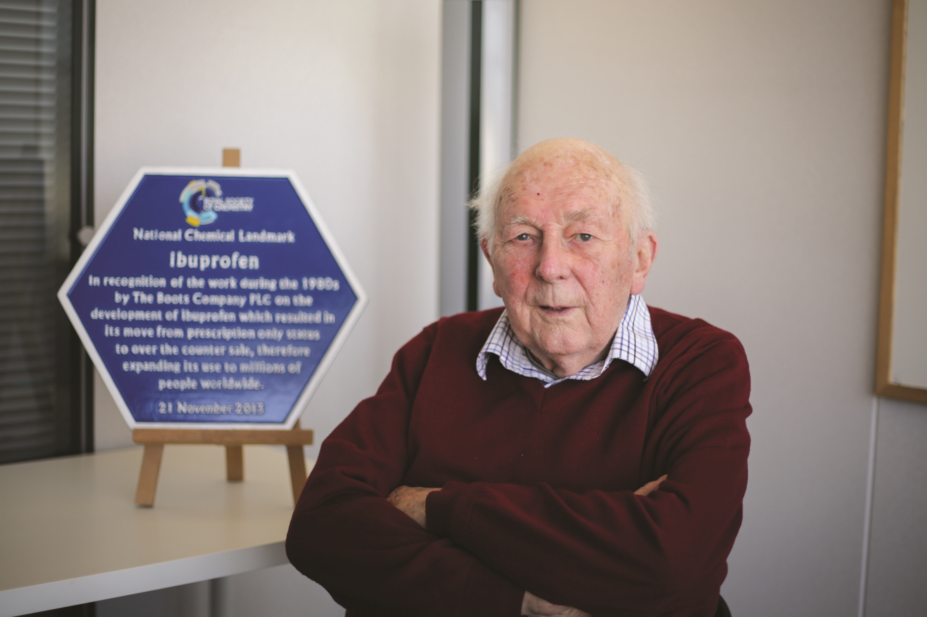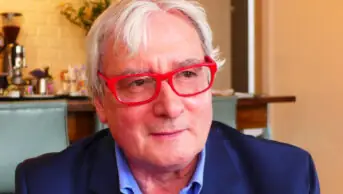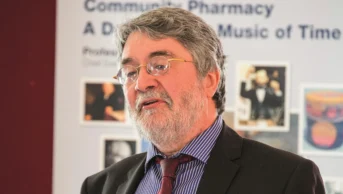
Gareth Logue / Walgreens Boots Alliance
Stewart Sanders Adams, who died aged 95 years on 30 January 2019, is best known for leading the team that discovered and developed ibuprofen, one of the world’s best selling anti-inflammatory painkillers.
The son of Alfred Adams and Gertrude Sanders, Adams was born in Byfield, Northamptonshire, on 16 April 1923. He was educated at Byfield Primary School, Doncaster Grammar School in South Yorkshire and March Grammar School in Cambridgeshire.
During an interview with The Pharmaceutical Journal in 2016, Adams said that he fell into the world of pharmacy “purely by chance” after leaving school aged 16 years, after his aunt — a Justice of the Peace in Daventry, Northamptonshire — started a conversation with the uncle of a senior executive in The Boots Company. Following a successful interview, Adams joined Boots in 1939 on a three-year apprenticeship.
At that time it was essential to undertake a registered apprenticeship before you could apply for a pharmacy qualification and Adams chose to do his bachelor of pharmacy degree at University College in Nottingham. As a pharmacy student, Adams was exempt from serving in the Second World War and was awarded his BPharm degree in 1945.
After completing his degree, Adams’ first job was in Boots’ penicillin production unit at the company’s main site in Nottingham, in the early days of penicillin when it was grown in milk bottles. Unfortunately, he found the role “disappointingly unchallenging”, and so, in 1947, he was given the opportunity to move to the pharmacology division of the research department.
His first research interest was in heparin. In 1948, he developed a unique assay for the anticoagulant, which went on to become the recommended method in the British Pharmacopoeia.
Over the next few years, Adams continued his studies of heparin at Leeds University where he obtained a PhD. In 1952, he returned to Boots to work on a new treatment for rheumatoid arthritis.
At that time, there were only two drugs on the market that were of proven value for the treatment of rheumatoid arthritis — a corticosteroid drug and aspirin in high doses. So, together with the help of John Nicholson, an organic chemist, Adams started testing aspirin analogues. However, the duo never found anything better than aspirin, which Adams described as their first “major disappointment”.
They continued to test the potency of hundreds of other compounds, with some going to clinical trial and one even making it to market, but they continued to come up against inactive compounds or unacceptable side effects. Eventually they ended up with a group of compounds called the propionics, which are now well known in the anti-rheumatic field. The first of these was ibuprofen, which went on to be tested in clinical trials and was found to be active and well tolerated.
In 1969, ibuprofen was approved by health authorities in the UK as a drug for the treatment of the rheumatic diseases — a new non-steroidal anti-inflammatory drug.
During these years, Adams told The Pharmaceutical Journal that he often tested compounds on himself. “I was the first to take the single dose [of ibuprofen] and later on I took a few doses.
“I always felt that if you were going to ask volunteers to take a drug and later patients, you ought to be prepared to take it yourself. In the case of ibuprofen it caused a slight burning in the back of the throat, so the tablets were sugar coated.”
Adams described ibuprofen as a “slow starter”, but once it was on the market and doctors started to use higher doses, sales took off and the drug became one of the best-selling antirheumatics in the UK.
Throughout the 1970s, Adams and Nicholson also looked in the use of ibuprofen for a whole range of painful conditions including headache, toothache and dysmenorrhea.
Finally, in 1983, after five years of discussions with the UK health authorities, ibuprofen was approved as an over-the-counter (OTC) product — one of the first in the UK to move over from being a prescription product to an OTC, non-prescription and pharmacy-only product.
In that same year, Adams officially retired from the research department at Boots, where he was head of pharmaceutical sciences. However, he continued his interest in ibuprofen and lectured widely on this and related topics.
In 1988, Adams was awarded an OBE and an honorary doctorate of science by the University of Nottingham in 2008. He also received two blue plaques from the Royal Society of Chemistry.
In 2013, Adams was made an ‘Honorary Freeman’ of Nottingham, a title awarded by the council to local people who have rendered eminent services to the borough. Jesse Boot, who established The Boots Company in 1883, received the same honour in 1920.
He also received an honorary fellowship from the Royal Pharmaceutical Society in 2017.
Adams’ achievements are marked on a ‘Heritage timeline’ erected in Boots’ main office, D90, which was installed on 12 February 2019 to mark the company’s 170th anniversary.
“He was such a legendary figure at Boots,” said Sophie Clapp, company archivist at the company. “Planning for the installation began well before we were aware of Dr Adams death — in fact I sent him an invitation, hoping that he would be able to see it for himself.”
During his life, Adams was a keen rugby player and a member of Nottinghamshire County Cricket Club before his “failing eyesight intervened”. He also read widely, with a special interest in modern European history and politics.
In 1950, Adams married Mary Harvey, a fellow member of the Boots research department, who according to Adams’ son David, provided “tremendous support during the frustrating periods when things weren’t working”.
Adams is survived by two sons and six grandchildren.
You may also be interested in

Bill Scott OBE (1949–2025)

David Taylor (1946–2025)
